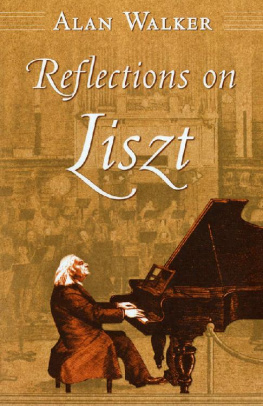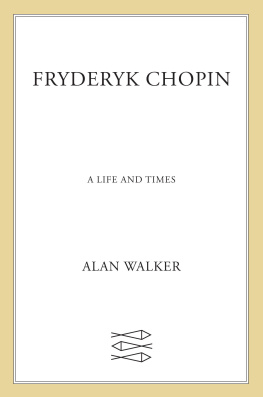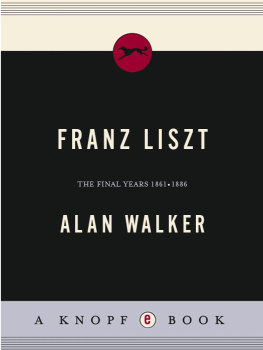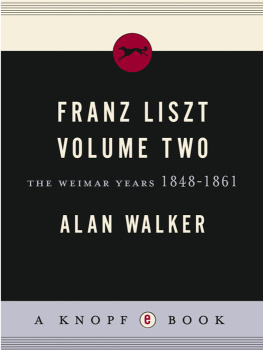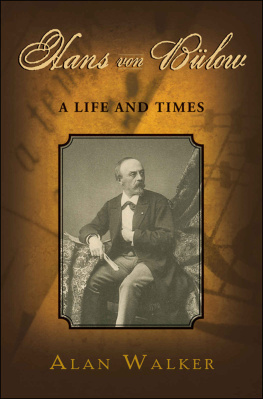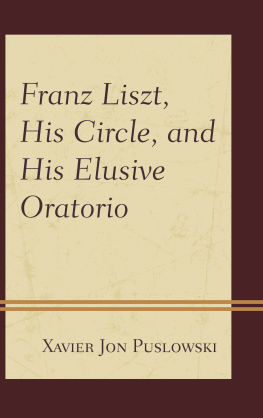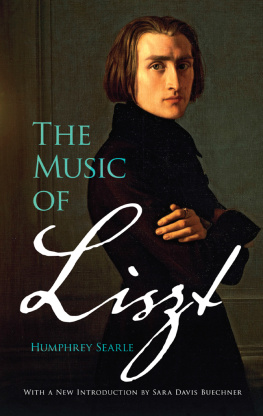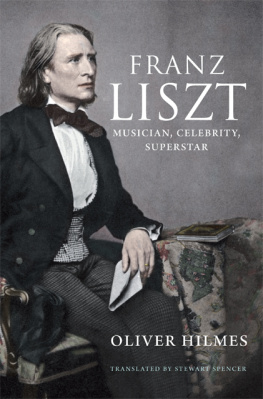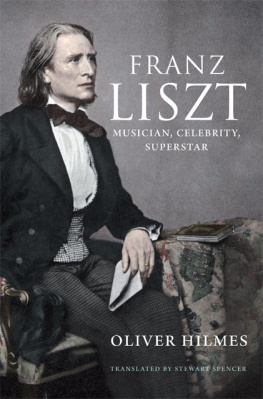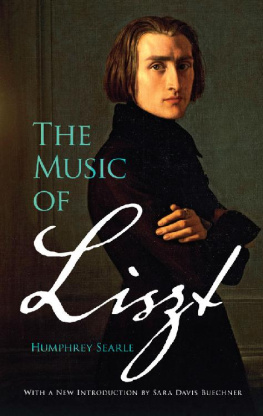Alan Walker

Reflections on L iszt

cornell university press
ithaca and london
For V alerie T ryon,
whose peerless interpretations of the music of Franz Liszt
have spoiled many another pianist for me
Contents
Illustrations
Acknowledgments
I would like to express my thanks to Mria Eckhardt and the staff of the library of the Liszt Research Centre, Budapest, for their scholarly support on all my visits to Hungary; to the Manuscript Department of the National Szchnyi Library, Hungary, for the loan of photographic materials; to Dr. Jane Gottlieb and the staff of the Lila Acheson Library of the Juilliard School, New York; to John Sheppard and the staff of the Lincoln Center Library for the Performing Arts, New York; to the staff of the Music and Rare Books Division of the British Library, London; to Dr. Horst Frster, who provided some important background information for my essays on Tausig and Blow; to Janet Snowman, librarian of the Royal Academy of Music, London, for making available documents related to Walter Bache; to Gregor Benko, for drawing my attention to some unpublished Blow correspondence; to William Wright for directing me to the first performance of Liszts Sonata in B Minor in England; to Dr. William Renwick, who prepared the music examples; and to Pauline Pocknell, who read the entire book in typescript, and, by spotting a number of errors, rescued me from ineptitude.
Alan Walker
Prologue
I
The impulse to write the present book arose from a desire to pursue certain topics that had to be glossed over in the course of publishing my three-volume life of Franz Liszt. Voltaire once reminded us, If you would be dull, tell all.My Liszt biography spanned more than 1, 600 pages; even so, in consequence of Voltaires injunction, it remained highly compressed. Such was the variety of Liszts life and work, in fact, that there were some things that could be mentioned only in passing, and others not at all. These included his activities as a writer and critic; his important contributions to the Lied; his attachment to the memory of Beethoven; his work as an editor of Schubert, Chopin, Weber, and others; his unusual approach to piano technique; and, above all, the powerful influence he exerted on the lives of his most important pupils, which continued long after they had ceased to study with him. I promised myself that I would one day return to these topics in order to elaborate on them, and it is a pleasure to do so now.
II
Toward the end of his life Liszt was asked why he never wrote his autobiography. It is enough to have lived such a life as mine, he replied. The remark was entirely typical of his self-irony. It was indeed a life filled with color and with incidents so graphic that the whole of Europe was riveted by them. Marked by triumph and marred by tragedy, Liszt was the first to acknowledge the strange paradox that he was so busy living his life that he had no time to write it. That was a great loss to history. Other composers, after all, had written notable autobiographies, including his great contemporaries Richard Wagner and Hector Berlioz. Liszt could have left them both standing at the post, for he had an amazing tale to tell. Alas, he left it to others to do so, and much mischief was created along the way.
There is surely no other composer in history whose daily existence was filled with such kaleidoscopic variety. As a boy, Liszt met Beethoven; as an elderly man he was introduced to Debussy. Between times he got to know practically every musician of importance and was on nodding terms with many of the crowned heads of Europe. His career unfolded in at least five directions simultaneously: pianist, conductor, composer, teacher, and tireless administrator. And in each of these fields he created something new. In the 1830s and 1840s, for example, he evolved a new style of piano playing and introduced the solo recitala word he appropriated in June 1840 and which all pianists since then have used. In the 1850s he invented the symphonic poem, his reply to the classical symphony, and introduced to the podium new techniques of conducting. He also administered some great international festivals at Weimar, featuring the music of Wagner, Berlioz, and Schumann. In teaching he introduced the concept of the masterclass and mentored pianists of the caliber of Carl Tausig, Hans von Blow, Moriz Rosenthal, and Eugne dAlbert. Then there was his private life, which brought him much notoriety and included several widely publicized liaisons with interesting women (one of whom, Countess Marie dAgoult, bore him three children, and another of whom, Olga Janina, planned to kill him and then commit suicide, failing in both endeavors). The fact that Liszt attempted to find solace from the storms of life by entering the lower orders of the Catholic Church when he was fifty-three years old simply added to the fascination. Merely to report the facts is to run the risk of being accused of writing fiction.
In the end it was left to Lina Ramann to take on the role of his official biographer. Her work has been much maligned, but she made the best of difficult circumstances, and Liszt willingly gave her personal interviews, supplementing them with more than 150 handwritten replies to various questionnaires she mailed out to him in the 1870s as he crisscrossed his way through Europe on those endless journeys of his. Liszts responses reveal him to have been a truth teller of the first order, the Doubting Thomases of Liszt scholarship notwithstanding, who staked their reputations on his lack of integrity, and lost.
III
There was one source of biographical material to which Ramann was obviously denied access: Liszts personal correspondence. Liszt is known to have written more than 10, 000 letters to about 1, 000 correspondents across the world. He was the first to recognize that the time taken to deal with this correspondence would have been far better spent in creating new music. Yet deal with it he did. He wrote from his homes in Weimar, Rome, and Budapest; from hotels, from private residences where he stayed as a guest; and even from the trains transporting him (often at night) from one city to another. Perhaps the most astonishing thing of all is that many of the letters went through preliminary drafts, their final texts being revised before they were dispatched. These Konzeptbriefeare often more revealing than the letters themselves, because they confess true sentiments Liszt later thought it better not to disclose. In sheer bulk, then, Liszts epistolary legacy is astounding. His letters are the autobiography that he claimed he never had the time to write.
That is why his correspondence is proving to be by far the most valuable resource that we have in writing about Liszts life and music. His letters teem with details about his daily activities. He talks to friends and colleagues about his work-in-progress;he delivers opinions on music and musicians, both past and present; he outlines his theoretical picture of music; he replies to his critics; he gives advice on musical interpretation; and on occasion he even enters the arena of music analysis and offers tantalizing clues as to the internal structure of certain of his compositions. Time and again, the letters provide solutions to those perennial puzzles of musicology, the what, where, how, and when of the matter. Not surprisingly, they are also the source to which the narrative of these Reflections most frequently turns.
Next page
